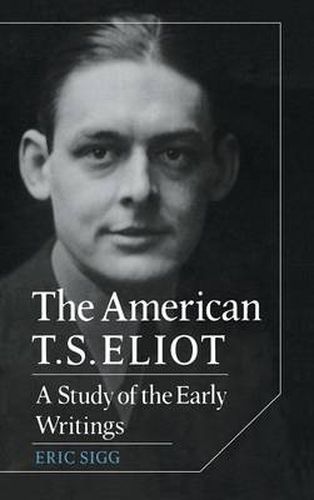Readings Newsletter
Become a Readings Member to make your shopping experience even easier.
Sign in or sign up for free!
You’re not far away from qualifying for FREE standard shipping within Australia
You’ve qualified for FREE standard shipping within Australia
The cart is loading…






In his old age T.S. Eliot said on a number of occasions that the American experience of his childhood and youth had had the deepest influence on his poetry. This is the first book to explore in detail how Eliot’s writings at once preserved and reacted against his complex American heritage: his intellectually and socially prominent family, their strong Unitarian culture, and their experience in nineteenth-century St. Louis and Boston. Analyzing major poems from The Love Song of J. Alfred Prufrock through The Waste Land, and drawing widely upon the early philosophical writings, essays, and reviews, Dr. Sigg shows the influence on Eliot of major American figures such as George Santayana, Henry James, and Henry Adams, as well as of the British philosopher F.H. Bradley on whom Eliot wrote a doctoral dissertation at Harvard.
$9.00 standard shipping within Australia
FREE standard shipping within Australia for orders over $100.00
Express & International shipping calculated at checkout
In his old age T.S. Eliot said on a number of occasions that the American experience of his childhood and youth had had the deepest influence on his poetry. This is the first book to explore in detail how Eliot’s writings at once preserved and reacted against his complex American heritage: his intellectually and socially prominent family, their strong Unitarian culture, and their experience in nineteenth-century St. Louis and Boston. Analyzing major poems from The Love Song of J. Alfred Prufrock through The Waste Land, and drawing widely upon the early philosophical writings, essays, and reviews, Dr. Sigg shows the influence on Eliot of major American figures such as George Santayana, Henry James, and Henry Adams, as well as of the British philosopher F.H. Bradley on whom Eliot wrote a doctoral dissertation at Harvard.